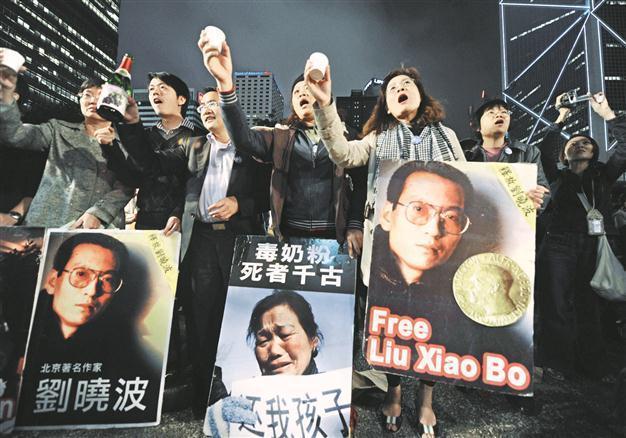China vows to be open despite web ‘detentions’
BEIJING

Protestors hold the poster of Nobel prize winner Liu Xiaobao (L) in Hong Kong in this Dec 2009 photo. China clamped down on dissidents, the Internet and the media as the Nobel committee readied to honour peace laureate Liu Xiaobo in Oslo. AFP photo
China will be more open about the often secretive workings of the government and ruling Communist Party in the coming year, although strict controls over the Internet would remain in place, a senior propaganda official said yesterday.Officials will expand the use of government spokespeople, boost the overseas reach of state media, and further promote the use of microblogs to interact with the public, Wang Chen told reporters. “In this new year, we will adopt an even more open attitude and even more forceful policies,” the Associated Press quoted Wang as saying.
Chinese government departments have traditionally been tightlipped, a result of authoritarian one-party rule in which officials had little accountability to the public and policies were drafted in high-level meetings without input from ordinary citizens.
Wang said news and information about government’s day-to-day activities as well as emergency responses would be expanded and systematized. Spokesmen would receive intensified training with an emphasis on obtaining first-hand information rather than simply passing on information from other departments, he said. Much of that public interaction has been driven by the Internet, and government departments at all levels now have not only websites but also Twitter-like microblogs on which to post breaking news.
‘Poem’ detention
China also blocks major social networking sites such as Facebook and Twitter out of fear they could be used to spread subversive content, or to organize public demonstrations such as those that spread last spring across the Arab world. Webmasters, pro-democracy activists, and journalists who have posted sensitive information on the Internet have been harassed, detained, and in some cases imprisoned. As a recent example a Chinese court has charged veteran democracy activist Zhu Yufu with subversion for publishing a poem online urging people to gather and call for greater freedoms, his lawyer said yesterday. The charges against Zhu, who previously served nine years in jail and has been in detention since March, center on a poem posted on the Internet in which he calls on the Chinese people to “take to the square to make a choice.” He was detained as part of a widespread crackdown on dissent that took place early last year in China after anonymous online calls for protests similar to those that swept the Arab world.
Wang said the government would compel those opening new microblog accounts in Beijing and other major cities to use their real names and other information.
















